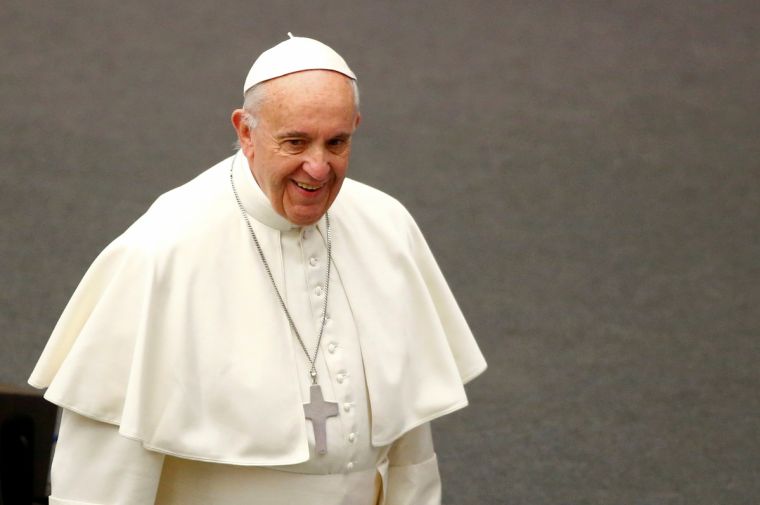What's wrong with slavery, anyway? Why reading the Bible sometimes isn't enough
The opposition of the Catholic Church to the death penalty is well known. Although – as in other areas of Church teaching – some Catholics are less enthusiastic about the official line than others.
Pope Francis reiterated yesterday his own passionate conviction that it's just wrong. But he also admitted that in the past there were things that would have been regarded as right, justified by reason and Scripture, that we now reject – slavery and 'wars of religion', for instance. We are guided by the Spirit who helps us 'to understand, to deepen our understanding of Jesus and to deepen our faith'.
'The people of God are always on their way,' and if they stop, 'they become like prisoners in a stable, like donkeys'.

Pope Francis is entirely at ease with this understanding of Christian truth, because the Catholic Church regards the Bible as one source of revelation rather than the only one, which tends to be the Protestant view – and in evangelical discourse, it is very definitely the assumption. Doctrine develops. What we used to think was right we now think is wrong. But that doesn't invalidate Church teaching, though it should make us more humble and careful about what we pronounce on. All truth is all there, in the original deposit handed to the apostles and recorded in the New Testament; it just needs to grow and unfold under the guidance of the Spirit, as new times bring new challenges and new insights from both sacred and secular sources.
This is the view formulated by Cardinal Newman in his Essay on the Development of Christian Doctrine in 1845. 'It is indeed sometimes said that the stream is clearest near the spring,' he said. 'Whatever use may fairly be made of this image, it does not apply to the history of a philosophy or belief, which on the contrary is more equable, and purer, and stronger, when its bed has become deep, and broad, and full. It necessarily rises out of an existing state of things, and for a time savours of the soil. Its vital element needs disengaging from what is foreign and temporary, and is employed in efforts after freedom which become more vigorous and hopeful as its years increase.'
He ends this terrific passage with the much-quoted (usually out of context): 'In a higher world it is otherwise, but here below to live is to change, and to be perfect is to have changed often.'
This is completely at odds with the view held by conservative evangelicals, both now and then. For evangelical Protestants, faithful discipleship is about getting back to the Bible. In extreme form, the last 2,000 years of theologising might as well never have happened: it's just about what the Bible says. Any attempt to interpret it in the light of modern insights into science, literature or psychology is just misguided. The closer you get to the source, the better.
In this way of thinking, Christian history has been a long struggle to retain the original purity of the gospel against the attacks of heretics, liberals and human nature. The 1st century was the golden age; nothing else has quite measured up. In the Catholic understanding, things have only got better; for evangelical Protestants, they've got considerably worse. The rows at the moment over gay marriage and 'gender fluidity' – transgender people – are just par for the course. Valiant truth-tellers have to stand up for the right, and if that means calling archbishops heretics, as one conservative did recently, so be it.
That's a broad-brush approach, and of course in real life there's something to be said for both sides; it isn't true, as Newman also said, that 'to be deep in history is to cease to be a Protestant.' But the current crisis in Anglicanism does illustrate the problem of authority. The rebels of Jesmond don't accept the authority of the Church; they only accept the authority of the Bible, just as independents do. If a denomination stops being biblical, as they see it, they shouldn't be part of it.
And it's not just Jesmond: there's a whole sector of evangelicalism that sees itself as embattled against the hordes of liberalism, resistant to the challenges of modernity. But one problem with this approach is that it leaves them with a very insecure grasp on what the Spirit might be doing today, as though God says nothing through what human beings think and discover. Doctrine doesn't develop; there's no scope for refinement or growth; any departure from the theological norm is an offence.
What is the future for this kind of conservatism? Its adherents have no particular grounds for thinking that slavery is wrong, or the death penalty; these things are in the Bible, after all. That many of them have risen above their theology is a credit to them, but their philosophical foundations are still pretty shaky.
I don't believe you have to accept the idea of an infallible Church, as Catholics do, in order to be an intellectually faithful disciple. But you do have to acknowledge that God did not stop speaking when the last word of the New Testament was written; that the Lord has yet more light and truth to break forth, not just from his Word, but from his works – the world of human art, science and skill. These insights have to be tested against the Scriptures, but they can't be dismissed as irrelevant. They will, and should, change how we read them and challenge our assumptions.
Follow Mark Woods on Twitter: @RevMarkWoods











